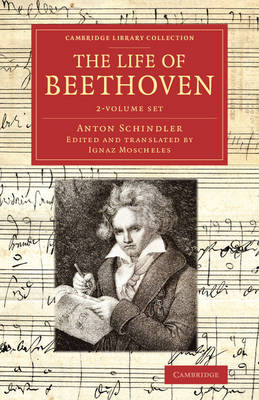Cambridge Library Collection - Music
1 primary work • 4 total works
Volume 1
Violinist and conductor Anton Schindler (1795–1864) became Beethoven's unpaid private secretary for two periods in the 1820s, notably caring for the composer in his last months. Schindler published his biography of Beethoven in 1840, and in 1841 this English translation appeared, with a preface and additional letters provided by the pianist Ignaz Moscheles (1794–1870), who in 1814 had prepared the piano version of Fidelio for publication by Artaria. That the biography is unreliable has long been recognised, as it presents Schindler's idealised, romantic view of Beethoven, whom he revered, and contains inaccuracies and fabrications uncovered by later research. While the work must therefore be approached with care, it remains nonetheless an important source of first-hand information through its use of documents unavailable to other early biographers. Volume 1 covers Beethoven's life to the completion of the Ninth Symphony in 1824.
Violinist and conductor Anton Schindler (1795-1864) became Beethoven's unpaid private secretary for two periods in the 1820s, notably caring for the composer in his last months. Schindler published his biography of Beethoven in 1840, and in 1841 this English translation appeared, with a preface and additional letters provided by the pianist Ignaz Moscheles (1794-1870), who in 1814 had prepared the piano version of Fidelio for publication by Artaria. That the biography is unreliable has long been recognised, as it presents Schindler's idealised, romantic view of Beethoven, whom he revered, and contains inaccuracies and fabrications uncovered by later research. While the work must therefore be approached with care, it remains nonetheless an important source of first-hand information through its use of documents unavailable to other early biographers. Volume 1 covers Beethoven's life to the completion of the Ninth Symphony in 1824. Volume 2 covers the period 1824-7, and includes Schindler's observations on Beethoven's music and character.
Violinist and conductor Anton Schindler (1795-1864) became Beethoven's unpaid private secretary for two periods in the 1820s, notably caring for the composer in his last months. Schindler published his biography of Beethoven in 1840, and in 1841 this English translation appeared, with a preface and additional letters provided by the pianist Ignaz Moscheles (1794-1870), who in 1814 had prepared the piano version of Fidelio for publication by Artaria. That the biography is unreliable has long been recognised, as it presents Schindler's idealised, romantic view of Beethoven, whom he revered, and contains inaccuracies and fabrications uncovered by later research. While the work must therefore be approached with care, it remains nonetheless an important source of first-hand information through its use of documents unavailable to other early biographers. Volume 1 covers Beethoven's life to the completion of the Ninth Symphony in 1824.
Violinist and conductor Anton Schindler (1795-1864) became Beethoven's unpaid private secretary for two periods in the 1820s, notably caring for the composer in his last months. Schindler published his biography of Beethoven in 1840, and in 1841 this English translation appeared, with a preface and additional letters provided by the pianist Ignaz Moscheles (1794-1870), who in 1814 had prepared the piano version of Fidelio for publication by Artaria. That the biography is unreliable has long been recognised, as it presents Schindler's idealised, romantic view of Beethoven, whom he revered, and contains inaccuracies and fabrications uncovered by later research. While the work must therefore be approached with care, it remains nonetheless an important source of first-hand information through its use of documents unavailable to other early biographers. Volume 2 covers the period 1824-7, and includes Schindler's observations on Beethoven's music and character.


